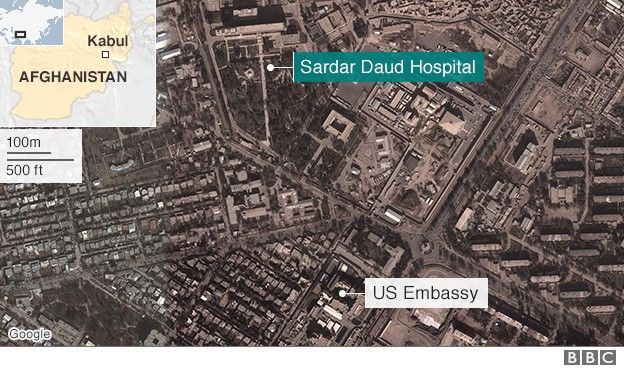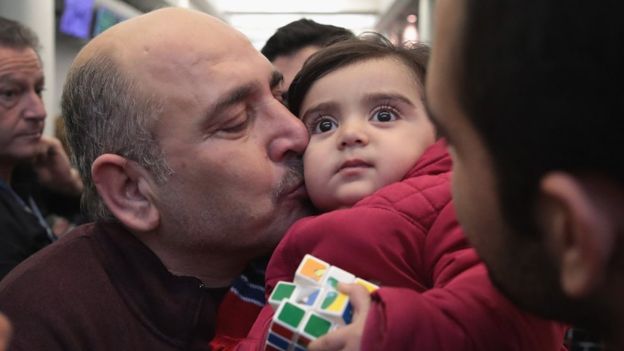-aHaMoNBe-'s Achievements
Newbie (1/14)
0
Reputation
-
-aHaMoNBe- changed their profile photo
-
[N]audy started following -aHaMoNBe-
-
More than 30 people have been killed after attackers dressed as doctors stormed the largest military hospital in Kabul, Afghan officials say. Militants armed with guns and grenades gained entry after one detonated explosives at a hospital gate and then opened fire on staff and patients. Commandos who landed on the Sardar Daud hospital roof killed all four attackers after several hours of fighting. The so-called Islamic State (IS) group has claimed the attack. The Taliban has denied any involvement. More than 50 people were also wounded, the defence ministry said. Read more: World powers jostle in Afghanistan's new 'Great Game' How successful has IS been in Afghanistan? Stuck between IS and the Taliban President Ashraf Ghani said the attack at the 400-bed hospital "trampled all human values". "In all religions, a hospital is regarded as an immune site and attacking it is attacking the whole of Afghanistan," he said. The attack began at 09:00 local time (04:30 GMT). One hospital staff member who was able to get out saw an attacker "wearing a white coat holding a Kalashnikov and opening fire on everyone, including the guards, patients and doctors". One employee wrote on Facebook: "Attackers are inside the hospital. Pray for us." Change of tactic: Analysis by Inayatulhaq Yasini, BBC Afghan The hospital attack marks a change in approach by so-called Islamic State fighters in Afghanistan - it's the first time they have engaged directly with security forces in the capital. Previously they have targeted civilian gatherings, mainly of Shia Muslims, as well as causing carnage at the Supreme Court last month. But at the hospital they used an approach more commonly associated with the Taliban - blowing the gates open to allow gunmen to enter. This suggests they now have the resources and the military training to expand their attacks. If that's the case, the security forces could face more such assaults in the coming months. In the two years since it announced its presence in Afghanistan, IS has mainly engaged with Afghan forces - and more powerful, rival Taliban fighters - in the east, near the Pakistan border. It has failed so far to widen its base in the country - one reason, observers suggest, it may now be mounting more headline-grabbing attacks. The government claims it has rooted out IS militants from a number of bases in the east - but has yet to dislodge them from mountainous areas they control. TV pictures showed people hiding from the gunmen on ledges outside windows on upper floors of the building. More than six hours after the attack began, interior ministry spokesman Sediq Sediqqi tweeted that special forces had ended their operation and all the attackers were dead. The IS-affiliated Amaq news agency shared two images via the Telegram messaging app that appeared to show one of the militants taking part in the assault and a number of dead bodies. Afghanistan's de-facto deputy leader Abdullah Abdullah also condemned the attack on Twitter and vowed to "avenge the blood of our people". S announced it was moving into Afghanistan and Pakistan when it declared its so-called Khorasan Province in 2015 and has since carried out a number of attacks. In July 2016, a suicide bomb attack on a rally in Kabul killed about 80 people. Three months later, two similar attacks during the religious festival of Ashura claimed about 30 lives and in November 2016 an attack at a mosque in Kabul killed more than 30. IS also claimed a suicide attack at Kabul's Supreme Court last month that killed 22 people and has stepped up activity in both Afghanistan and Pakistan. The Taliban has also been carrying out attacks, killing 16 people in Kabul in suicide attacks a week ago, after beginning its Spring offensive early.
-
President Donald Trump has signed a new executive order placing a 90-day ban on people from six mainly Muslim nations. Iraq - which was covered in the previous seven-nation order - has been removed from the new one after agreeing additional visa vetting measures. The directive, which includes a 120-day ban on all refugees, takes effect on 16 March to limit travel disruption. The previous order, which was blocked by a federal court, sparked confusion at airports and mass protests. Live updates on new travel ban Five questions ahead of new US travel ban Why did a US veteran give a stranger his Purple Heart? Grey line What is different about the new order? Citizens of Iran, Libya, Syria, Somalia, Sudan and Yemen, the other six countries on the original list, will once more be subject to a 90-day travel ban. Iraq was taken off the banned list in the original order - which was issued on 27 January - because its government has boosted visa screening and data sharing, White House officials said. The new order says refugees already approved by the State Department can enter the US; it limits the number allowed in to 50,000 for the year. The directive also lifts an indefinite ban on all Syrian refugees. Green Card holders (legal permanent residents of the US) from the named countries will not be affected by the new order. The new order also does not give priority to religious minorities, unlike the previous directive. Critics of the Trump administration had argued that was an unlawful policy showing preference to Christian refugees. What does the administration say? Secretary of State Rex Tillerson, Attorney General Jeff Sessions and Homeland Security Secretary John Kelly held a joint news conference on Monday morning to discuss the new directive. America's top US diplomat said the order was meant to "eliminate vulnerabilities that radical Islamic terrorists can and will exploit for destructive ends". Mr Sessions said that, according to the FBI, more than 300 people who entered the US as refugees are under investigation for potential terrorism-related offences. The top US prosecutor said three of the countries were state sponsors of terrorism. The other three, Mr Sessions said, had lost control of territory to militants such as the Islamic State group or al-Qaeda. Mr Kelly added that unregulated and unvetted travel was putting national security at risk. "Our enemies will exploit our freedoms and generosity to harm us," Mr Kelly told reporters. He said the US cannot tolerate "malevolent actors using our immigration system to take American lives". None of the cabinet secretaries took any questions after the press conference. Grey line Analysis - Anthony Zurcher, BBC News, Washington Donald Trump has, at last, unveiled his new immigration order, and it looks like government lawyers - and not just White House political operatives like Steve Bannon and Stephen Miller - have had their input. Gone are the most controversial measures of the old order, such as preference for Christian refugees and the suspension of existing visas and green cards. The details of the action's implementation are outlined with greater clarity this time, with more than a week before the new rules kick in. It's still an open question as to what, if anything, this order will do to prevent violent attacks on US soil, given that past high-profile incidents have not involved individuals from any of the six named countries. Mr Trump promised bold action on border security, however - the kind of move that would unnerve traditional politicians and anger civil liberties advocates. Given the early reaction from groups like the ACLU and Democratic leaders, the story is unfolding as expected. Although Mr Trump's campaign-rally talk of sweeping Muslim bans are a thing of the past, his supporters will likely revel in the uproar and consider this latest move a campaign promise kept. Grey line When will the new ban take effect? The new order is set to take effect on 16 March. The 10 days' advance notice may help to avoid some of the chaotic scenes at US airports that occurred on 27 January when the first executive order was announced without warning. Travellers with valid visas who were in the air at the time of the order found themselves detained by border officials on arrival. At the time, Mr Trump defended the lack of notice, tweeting that "if the ban were announced with a one week notice, the 'bad' would rush into our country during that week". Will the new executive order face legal challenges? Yes. New York Attorney General Eric Schneiderman - the state's highest ranking law enforcement officer - issued a statement on Monday saying his office is ready to take the Trump administration to court. "While the White House may have made changes to the ban, the intent to discriminate against Muslims remains clear," he said. "My office is closely reviewing the new executive order, and I stand ready to litigate - again - in order to protect New York's families, institutions, and economy." Meanwhile, the American-Arab Anti-Discrimination Committee (ADC), an Arab-American grassroots civil rights organisation, has called for donations to fight impending legal battles ahead. "The ban is about xenophobia and Islamophobia," the group said in a statement to the BBC. "The new ban will have the same effect on our community as the initial one did, and ADC will continue to provide pro bono legal assistance to those impacted."


![[N]audy](https://csblackdevil.com/forums/uploads/monthly_2020_06/lCGU8Xg.thumb.png.45679e2de49e686878288cdf7b53f6f4.png)



